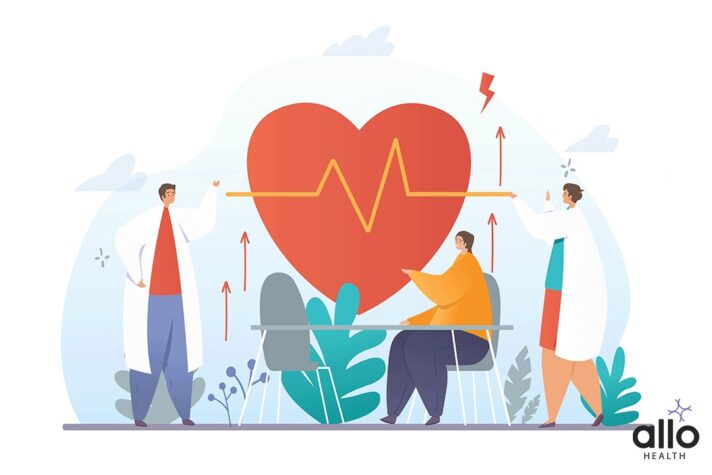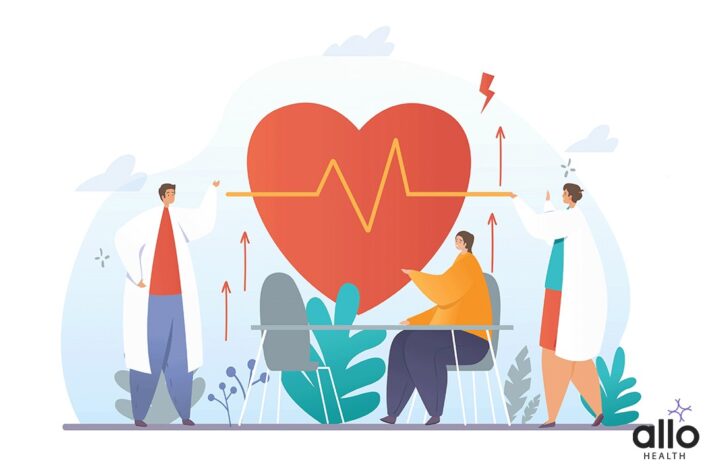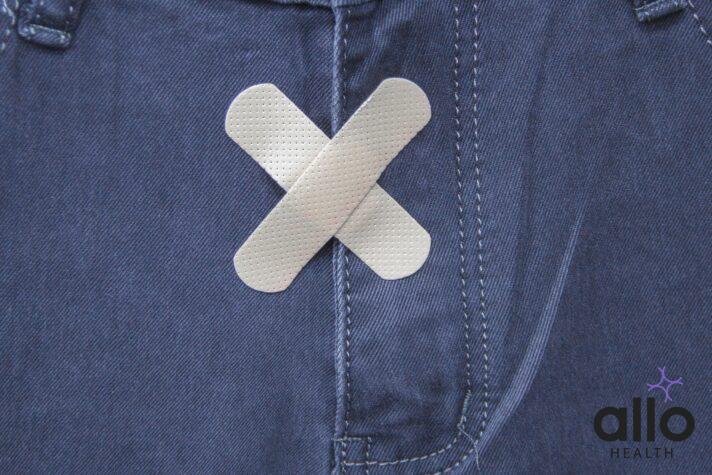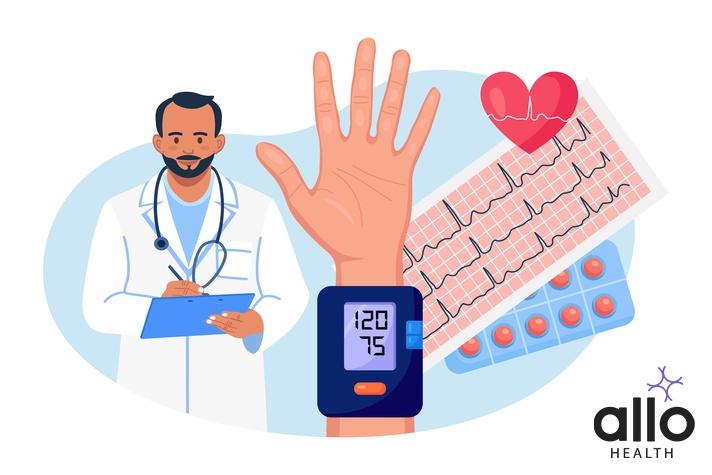Can High Blood Pressure Cause Premature Ejaculation?

Allo Health is dedicated to personalized well-being, offering support and trusted information tailored to individual health goals. The platform emphasizes human-generated content, led by a distinguished medical team of experts, including physicians and sexual health specialists. Their commitment to credibility involves rigorous fact-checking, authoritative research, and continuous updates to ensure accurate, up-to-date information. Allo Health's unique approach goes beyond conventional platforms, providing expert-led insights and a continuous commitment to excellence, with user feedback playing a crucial role in shaping the platform's authoritative voice.

Satadeepa is a Psychologist with 5 years of experience in the field of mental health and holds a Master's Degree in Clinical Psychology. Her areas of work interest and specialization include anxiety & mood disroders, relationship issues, self esteem development, grief, behavioural sleep medicine and sexual wellness.
Why This Was Upated?
Our experts continually monitor the health and wellness space, and we update our articles when new information became available.
Updated on 11 November, 2023
- Article was updated as part of our commitment to diversity, equity, and inclusion.

"The following blog article provides general information and insights on various topics. However, it is important to note that the information presented is not intended as professional advice in any specific field or area. The content of this blog is for general educational and informational purposes only.
Book consultation
The content should not be interpreted as endorsement, recommendation, or guarantee of any product, service, or information mentioned. Readers are solely responsible for the decisions and actions they take based on the information provided in this blog. It is essential to exercise individual judgment, critical thinking, and personal responsibility when applying or implementing any information or suggestions discussed in the blog."
High blood pressure (BP), also known as hypertension, is a common health condition that affects millions of people worldwide. It is well known for its potential to lead to serious complications, such as heart disease or cardiovascular disease and stroke. But can high blood pressure also cause premature ejaculation (PE)?
Let’s delve into the relationship between hypertension and sexual health, exploring the possible connection between these two conditions. Along the way, we will discuss the symptoms, causes, and treatments for both high blood pressure and premature ejaculation, as well as answer some frequently asked questions on the subject.
So, Can High Blood Pressure Cause Premature Ejaculation?
Understanding High Blood Pressure
What is High Blood Pressure?

High blood pressure, or hypertension, occurs when the force of blood against the walls of your arteries is consistently too high. BP is measured in millimeters of mercury (mm Hg) and is recorded as two numbers: systolic pressure (the top number) and diastolic pressure (the bottom number). Normal blood pressure is generally considered to be 120/80 mm Hg or lower. High BP is diagnosed when the systolic pressure is 130 mm Hg or higher, or the diastolic pressure is 80 mm Hg or higher, on two or more separate occasions.
Causes of High Blood Pressure
There are several factors that can contribute to the development of high BP, including:
- Genetics: A family history of hypertension increases your risk of developing the condition.
- Age: The risk of high BP increases as you get older.
- Race: African Americans are more likely to develop hypertension than other racial groups.
- Lifestyle factors: Poor diet, lack of exercise, smoking, and excessive alcohol consumption can all contribute to high BP.
- Medical conditions: Kidney disease, sleep apnea, and hormone imbalances can cause high BP
Understanding Premature Ejaculation
What is Premature Ejaculation?
Premature ejaculation (PE) is a common male sexual condition characterized by the inability to control ejaculation, resulting in ejaculation occurring sooner than desired (mostly within a minute or less than 2 minutes) during sexual activity. This often leads to distress and dissatisfaction for both partners. There are two main types of PE:
- Lifelong (primary) PE: This type of PE occurs from the first sexual experience and persists throughout life.
- Acquired (secondary) PE: This type of PE develops after a period of regular sexual functioning without any difficulty or complaints related to ejaculation.
Causes of Premature Ejaculation
Premature ejaculation can have a variety of causes, including:
- Psychological factors: Anxiety, depression, stress, and relationship concerns can contribute to PE.
- Biological factors: Hormonal imbalances, neurotransmitter levels, and inflammation of the prostate or urethra can be involved in the development of PE.
- Behavioral factors: Early sexual experiences and learned patterns of sexual behavior can lead to PE.
How High Blood Pressure May Influence Sexual Health
High BP can have a direct impact on sexual health for several reasons:
- Vascular damage: Hypertension can damage blood vessels, leading to reduced blood flow to the penis. This can make it difficult to achieve or maintain an erection, which may contribute to PE.
- Medications: Some medications used to treat high BP, such as diuretics and beta-blockers, can cause sexual side effects, including PE.
- Psychological factors: The stress and anxiety associated with managing high BP can contribute to sexual performance anxiety, which can exacerbate premature ejaculation.
Research on the Link Between Hypertension and Premature Ejaculation
Can High Blood Pressure Cause Premature Ejaculation?
High blood pressure, also known as hypertension, is a common condition that affects millions of people worldwide. Hypertension occurs when the force of blood against the walls of your arteries is consistently high, which can lead to serious health concerns such as heart disease, stroke, and kidney disease. While hypertension primarily affects your cardiovascular system, recent research has shown that it can also have a significant impact on your sexual health.
Several studies have suggested that hypertension may contribute to PE. One study published in the Journal of Sexual Medicine found that men with hypertension were more likely to experience PE than men without hypertension. The study also found that men who were taking medication to lower their blood pressure had a higher risk of PE than men who were not taking medication. This suggests that hypertension itself may be a risk factor for PE, but the medication (blood pressure medicines) used to treat hypertension may also contribute to sexual dysfunction.

Another study published in the International Journal of Impotence Research found a similar link between hypertension and PE. The study found that men with hypertension were more likely to experience PE than men without hypertension. The researchers also found that the severity of hypertension was positively correlated with the severity of PE. This suggests that the higher your blood pressure, the more likely you are to experience premature ejaculation.
How Does Hypertension Cause Premature Ejaculation?
While the link between hypertension and PE is still not fully understood, there are several ways in which hypertension may contribute to sexual dysfunction in men. One of the main ways that hypertension can cause PE is by affecting penile blood flow.
Hypertension can result in damaged blood vessels in your body, including the ones that supply blood to your penis. When these blood vessels are damaged, it can be difficult for blood to flow to your penis, leading to erectile dysfunction and PE. This is because an erection relies on a sufficient amount of blood flow to the penis, and without it, achieving and maintaining an erection can be difficult.
Another way that hypertension can cause PE is by affecting the nervous system. High blood pressure can damage the nerves that PE, leading to a loss of control over when you ejaculate. This can make it difficult to delay ejaculation during sexual intercourse, leading to PE.
Additionally, hypertension can also cause psychological factors that contribute to PE. For example, men with hypertension may experience anxiety or stress related to their condition, which can lead to sexual dysfunction. This is because anxiety and stress can increase your heart rate and blood pressure, making it more difficult to control your ejaculation.
Treatment Options for High Blood Pressure and Premature Ejaculation

Managing High BP
Effective management of high BP can help improve overall health and may also have a positive impact on sexual function. Strategies for managing hypertension include:
- Medications: Doctors may prescribe medications such as diuretics, beta-blockers, ACE inhibitors, or calcium channel blockers to help lower BP.
- Lifestyle changes: Eating a healthy diet, exercising regularly, quitting smoking, and limiting alcohol consumption can all help lower BP.
- Stress management: Practicing relaxation techniques, such as deep breathing exercises, meditation, or yoga, can help reduce stress and improve BP.
Treating Premature Ejaculation
There are several treatment options available for managing PE, including:
- Behavioral techniques: The “stop-start” and “squeeze” techniques can help men/individuals gain more control over their ejaculation.
- Topical anesthetics: Numbing creams or sprays applied to the penis can help delay ejaculation by reducing sensitivity.
- Medications: Certain medications, such as selective serotonin reuptake inhibitors (SSRIs), can help delay ejaculation.
- Counseling: Therapy that addresses the psychological factors contributing to PE can be beneficial.
Frequently Asked Questions
(1) How does high blood pressure affect sexual performance?
High blood pressure can impair sexual performance by interfering with blood circulation and damaging blood vessels. This can lead to erectile dysfunction (difficulty achieving or maintaining an erection) and premature ejaculation (ejaculating before desired). By managing your blood pressure through lifestyle changes and medications, you can improve your sexual health.
(2) Can blood pressure medications worsen premature ejaculation?
Some blood pressure medications, specifically those that belong to the class of beta-blockers, have been associated with sexual side effects, including difficulties with ejaculation. However, not all blood pressure medications have this effect, and individuals may respond differently. If you are concerned about the impact of your blood pressure medication on premature ejaculation, consult with your healthcare provider to explore alternative options.
(3) Are there lifestyle changes that can improve both high blood pressure and premature ejaculation?
Absolutely! Certain lifestyle changes can positively impact both high blood pressure and premature ejaculation. Maintaining a healthy diet, exercising regularly, managing stress levels, avoiding smoking and excessive alcohol consumption, and getting enough sleep can all contribute to better cardiovascular health and sexual function. Incorporating these habits into your daily routine can help improve both conditions simultaneously.
(4) How common is premature ejaculation in individuals with high blood pressure?
Premature ejaculation is a common sexual concern in men, regardless of their blood pressure status. However, high blood pressure can exacerbate the concern. The exact prevalence of premature ejaculation in individuals with high blood pressure varies, but it is important to address both conditions to enhance overall sexual health and well-being.
(5) Can high blood pressure medications improve premature ejaculation?
While high blood pressure medications primarily target blood pressure control, some individuals may experience improvements in their sexual function, including premature ejaculation, as a result of better blood flow and overall cardiovascular health. However, the effect of medications on premature ejaculation can vary from person to person. Discuss any concerns or potential side effects with your healthcare provider to explore the most suitable treatment options.
(6) Can stress from high blood pressure contribute to premature ejaculation?
Stress is a common factor contributing to sexual concerns, including premature ejaculation. High blood pressure can increase stress levels due to its impact on overall health and well-being. Stress can interfere with sexual performance, arousal, and ejaculation control. Adopting stress management techniques such as relaxation exercises, meditation, or seeking therapy can help address both high blood pressure and premature ejaculation.
(7) Is there a connection between high blood pressure, premature ejaculation, and anxiety?
High blood pressure, premature ejaculation, and anxiety can all be interconnected. Anxiety, whether related to high blood pressure or other factors, can worsen sexual performance and contribute to premature ejaculation. Anxiety can create a cycle where worrying about sexual performance leads to increased anxiety and further exacerbation of premature ejaculation. It is crucial to address anxiety through various methods, such as therapy, relaxation techniques, and open communication with your partner.
(8) Can treating high blood pressure help resolve premature ejaculation?
Treating high blood pressure can potentially improve premature ejaculation, especially if the condition is primarily caused by reduced blood flow. By effectively managing high blood pressure through lifestyle changes and medications, you may experience improved cardiovascular health, enhanced blood flow, and better overall sexual function. However, it is important to consult with a healthcare professional to determine the underlying causes of premature ejaculation and develop an appropriate treatment plan.
The relationship between high blood pressure and premature ejaculation is complex, with some research suggesting a connection between the two conditions. Managing high blood pressure through a combination of medication, lifestyle changes, and stress reduction can not only improve overall health but may also have a positive impact on sexual function. If you’re concerned about high blood pressure and premature ejaculation, it’s essential to consult with your healthcare provider to develop a personalized treatment plan that addresses both conditions.







































